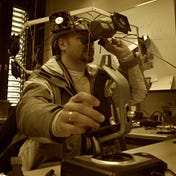George Papagiannakis is a computer scientist specialized in computer graphics systems, extended reality algorithms and geometric algebra computational models. He obtained his PhD (Hons) in Computer Science from the University of Geneva, Switzerland in 2006, his M.Sc. (Hons) in Advanced Computing from the University of Bristol, UK and his B.Eng. (Hons) in Computer Systems Engineering, from the University of Manchester, UK. He is currently associate professor at the Computer Science department of the University of Crete, Greece, associated faculty member at FORTH-ICS with the Human Computer Interaction Lab and visiting associate professor at the University of Geneva. Prior to this post, he had worked as lecturer, senior researcher and research assistant at MIRALab, University of Geneva with Prof. Nadia Magnenat-Thalmann. He has also been employed as lead computer graphics programmer in the industrial virtual reality simulation sector. His research and development interests are centered in the field of high-fidelity interactive computer graphics systems for human computer interaction, featuring embodied presence, psychomotor learning and gamification with simulated virtual humans in extended reality based on geometric algebra computational models. Research questions are driven from experiential medical VR training to virtual heritage, and from geometric algebra GPU computational simulation to intelligent, symbiotic extended reality systems for virtual humans and other big datasets. He has more than 80 publications in the field, over 1832 citations and h-index 23 (Jan 2021). He is a board member of the Computer Graphics Society (CGS) and member of the IEEE, ACM, Eurographics and SIGGRAPH professional societies. He is associate editor of the Springer Visual Computer Journal, research topic lead editor of the Frontiers in Virtual Reality Journal and evaluator/reviewer for the European Commission and several National Research Funding agencies worldwide.
Sitemap

George Papagiannakis
Medium member since August 2018

George Papagiannakis
Prof. George Papagiannakis is a computer scientist specialized in computer graphics, XR, HCI, geometric computational models at UoC, FORTH, ORamaVR, UniGE